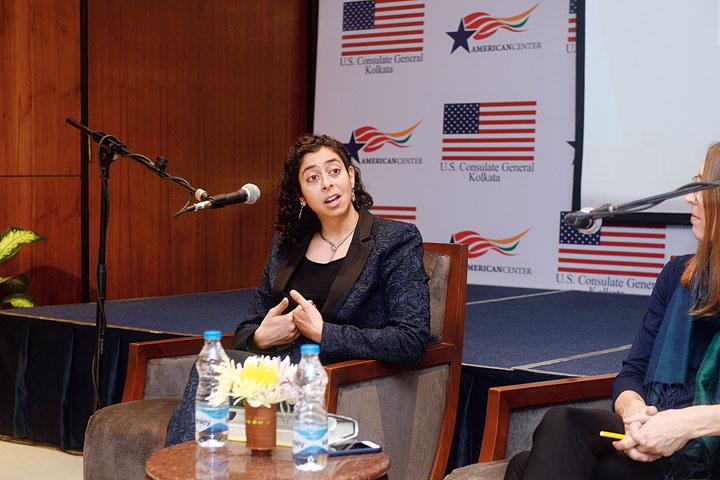If India calls itself the world’s largest democracy, it should act like one, said a former US Marine who has fought discrimination all her life.
Anuradha Bhagwati, rights activist and author, has led a sustained campaign against sexual harassment and misogyny in the US armed forces.
Anuradha is the daughter of celebrated economists Padma Desai and Jagdish Bhagwati, both teachers at Columbia University. Her father had been a vocal supporter of Narendra Modi’s demonetisation drive.
“India is supposed to be the world’s largest democracy. If India calls itself the world’s largest democracy, it should act like the world’s largest democracy. To be a thriving democracy, there needs to be protests, plurality of ideas. I hope India moves in that direction where protesters are not thrown in jail for expressing their points of view and expressing their desire for freedom and equality,” Anuradha told The Telegraph at the American Center on Saturday.
In front of a young audience, Anuradha discussed her book, Unbecoming: A Memoir of Disobedience. The account of an Indian growing up in America, the book traces Anuradha’s struggles — from a brown kid growing up in a predominantly white America to not conforming to traditional sexual identity to battling misogyny and abuse in the US Marine Corps.
She spoke to The Telegraph on the sidelines of her address. Anuradha said that although she was “not on the ground”, she was aware of the unrest triggered by the new citizenship thrust in India.
When this newspaper asked about her father’s perceived proximity to Narendra Modi and if the current Indian situation was discussed in the Bhagwati household, Anuradha said: “It is discussed. We have very lively discussions at home. My father and I disagree on many things. I am a fierce defender of religious minority, sexual minorities, women. So when I see a sign of anyone with fewer protection in society being harassed, I am very concerned.”
“I am concerned about the status of Muslims and Christians in India. I did not live through Partition. My parents did. My aunts and uncles did. My grandfather, my uncles were freedom fighters. I am aware of South Asia’s very rich and violent history. So, it worries me when there is religious animosity. History repeats itself. I worry about people who are in the minority. We need to support one another,” she added.
Growing up in an environment where grades mattered the most, Anuradha graduated from Yale before joining the Marine Corps.
She left the Marine Corps after an officer she reported for sexual harassment was promoted even after an internal probe found him guilty. Anuradha is the founder of Service Women’s Action Network (SWAN), which brought national attention to sexual abuse in the US armed forces and contributed to the lifting of the ban on women from pursuing combat roles.
“Not something we see a lot,” was how American Center director Monica Shie — the moderator of the session — described Anuradha’s career chart. Shie told this newspaper later that Anuradha was speaking as an American citizen and not a functionary of the US government.
“I got into these schools which was great opportunity (but) I wasn’t feeling myself. I had this kind of fighting spirit, always passionate about social causes,” Anuradha said.
In the same vein, she spoke of being sexually assaulted as a teenager in a subway and “not being able to speak up on it for 25 years” because though her parents were “lovely people”, “we did not have that language and we never talked about such things”.
Mom Desai found out that Anuradha fell in love with a girl — her best friend — by reading her daughter’s diary. “My mother was so overcome with grief and shame and anger that she threatened to kill herself if I did not end it…. I took her on face value and ended it (the relationship). As a result, I just shut down a part of myself for years… that needed to be expressed in order to be my full self.”
Anuradha’s mother took her out for coffee one day and opened up about her first marriage, “back in India, not with my father”. Desai had a “horrible and abusive” first husband but back in the 1950s, she “had the courage to leave that man”.
Anuradha said she channelled the “rage for that man” into the military and was “very protective of women around her”.
In the Marine Corps, she served in multiple places, including Okinawa in Japan. She saw “sexual harassment” both inside the forces and “commercial sexual exploitation” of the local population where her bases were stationed. Rape jokes and pornography were some aspects of the entrenched sexism and misogyny in the armed forces, according to Anuradha.
She found the “puritanical values” strange. “You could be jailed for having consensual sex. But non-consensual sex — rape, assault and harassment — go unpunished,” she said.










